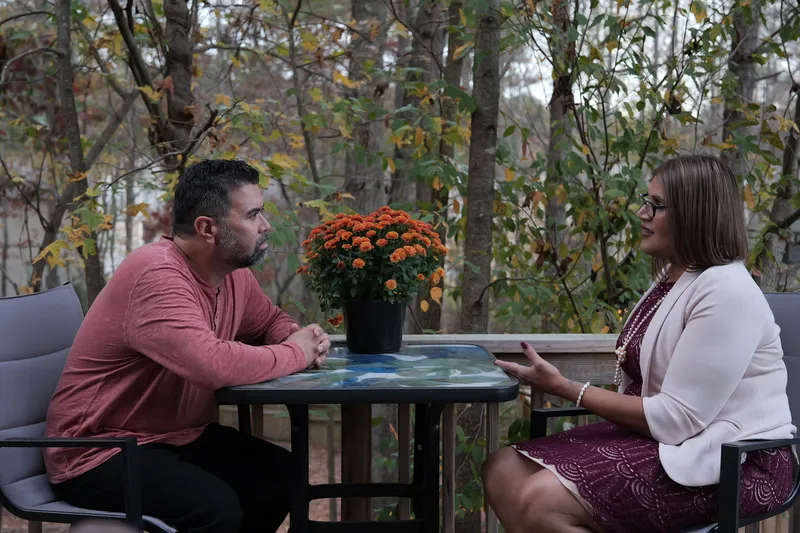
Money issues

What is it?
While the term “money issues” is broad and can mean many things to different people, most simply it refers to how you relate to money in your day-to-day life as a source of stress. Probably the most common worry is not having enough money to meet your needs or worrying you might not have enough money in the future.
Money is a stressor for many people, especially now, given the uncertainty following the COVID-19 pandemic and the rising cost of living. A recent survey found that money was the most cited factor negatively affecting mental health, with 52% of respondents citing money as their top concern.1 In the same survey, specific money concerns varied between groups. For example, rent and housing costs were a concern among many millennials and being unprepared for retirement was common among Gen X respondents.
It’s common to worry about money from time to time, but if occasional concerns become heavier, ongoing stress that disrupts your life or your relationships, it can take a big toll on your emotional, physical and social well-being. Money issues can worsen your sleep, self-esteem and energy and may lead you to have feelings ranging from anger to sadness to worry. You may then find that you self-isolate, or you may find yourself getting into more family conflicts (as money is a common source of stress in these networks).
Other signs of a more significant issue may include:
- Difficulty managing your finances
- Lack of confidence in the future
- Being unable to enjoy living in the moment
To cope, you may turn to unhealthy mechanisms like substance use or non-substance addiction such as gambling. But, that likely only compounds your existing money issues. No matter how frustrating or hopeless your situation can feel, there are ways to deal with stress related to money issues and to change your situation for the better.
What’s causing it?
There are many causes for financial stress, and they vary from person to person and family to family, but a few common ones are:
- Job loss
- Reduced work hours or income
- Lack of stable income
- Lack of savings
- Debt
- Costs of healthcare, housing or food
- Separation, divorce, or death of a partner
- Unexpected large costs (likely from an emergency)
- Cost of education or student loans
- Taxes
- Bankruptcy
- Inflation
- Unable to retire
At a basic level, not having enough money happens when your income from work is less than how much money you spend living your life. Unemployment or unexpected costs can cause difficulties. Meanwhile, jobs that pay too little (of which there are many), dealing with debt, and caring for family can create a long-term, ongoing challenge.
Behaviors fueled by mental health conditions can also contribute to not having enough money and added financial stress. For example, depression or grief might be the cause behind extended unemployment or unpaid debt, and someone with a mood-related condition or a diagnosed personality disorder might make impulsive purchases or risky investments.
Unfortunately, how we feel and respond to challenges with money can make money issues worse. Tasks like opening bills, viewing bank statements or just talking about money can cause stress that leads folks to avoid meaningfully tackling problem areas. Money issues could also lead to serious conditions like depression or low self-worth that make it even harder to deal with and, at worst, could spiral into thoughts of self-harm.
In some cases, money issues are result of financial abuse. This is when someone tries to control you with money by limiting access to your own accounts, withholding money, or providing money only in exchange for certain actions. If you find yourself in this situation, talk to people you trust about it, and consider seeking help from a professional.
How should I deal with it?
It can be difficult to admit money issues are affecting your life or even to notice them, but recognizing them and taking action are necessary steps to regaining a sense of control and security.
Some steps you can take include:
- Assess your situation. Understand your debt, expenses, and income, so you have a clear picture of your situation as a whole. This takes time to organize, which can be difficult, but is important to know how to address it.
- Review monthly spending. Track how you spend your money and what triggers certain purchases (including your moods). Make sure you’re aware of charges like interest rates or subscription fees. Of note, some apps can find out your subscription fees and cancel them for you if you don’t have time to do that yourself.
- Create a budget. Identify small things you can cut from your expenses, and create goals and a plan for what you can reasonably and comfortably spend moving forward based on the resources you have. Try to create a plan and stick with it, and enlist your partner or family members so that they are on the same page.
- Try to make small changes. Spending money on things like a coffee or an Uber can add up over the month. While you shouldn’t deny yourself everything you might do for fun, try to find ways to cut down on nonessential spending.
- Stop impulse buying. It can be incredibly tempting to see something in a store and just buy it, but if it is not in your plan, it can really mess up your budget. Try to make a rule where you wait before buying something, and if you assess that you can and still want it after a few days or even a week, you can let yourself buy it at that time.
- Practice self-compassion. It can be easy to blame yourself for financial difficulties, but everyone struggles from time to time. Try to reframe the negative thoughts you have about yourself in a way you would talk to a friend.
If you need more help, there are resources available:
- Employee assistance program (EAP): Reach out to an EAP if your workplace has one. Sometimes these programs offer financial assistance—other times, they may help you find someone to talk to about the stress of it all. Keep in mind that there are also financial therapists with specific training in these issues that you can try to find to help, if you are able.
- Student loan assistance: Explore options for consolidation, forbearance (pausing payments) or loan forgiveness.
- Payment plans: Ask your bank, credit card and utility companies about breaking larger debts down into smaller regular payments. To reduce the chance of unpaid bills that affect your credit, consider setting up a low automated monthly payment.
- Government assistance: Visit benefits.gov to see if you qualify to receive payments, goods or services to help with basic living expenses.
Money issues are about more than just the numbers. Don’t be afraid to talk to a loved one to process the challenges you’re having.
Things to try
-
If you're going through a challenging time, think about who you feel comfortable with, and what interactions might feel supportive so you can tell people what you need—whether it's talking about how you’re feeling so you can release some pent-up emotions, or finding comfort by time together with no words exchanged.Explore More
-
Try talking about it
It might be that talking about what you're going through is the last thing you feel like doing. Or, it might be that you don't feel like talking to your loved ones about it. Ironically, this is usually a sign that getting something off your chest may be essential to healing. Consider asking a therapist or someone you trust to be a sounding board for you. You only need to start with one person.Explore More -
Try the 5-4-3-2-1 relaxation and grounding technique
Relaxing can help counter a fight-or-flight stress response. The 5-4-3-2-1 technique is one approach you can try. To do this, pause for a moment to take notice of your surroundings, Ask yourself a series of questions, counting down from 5: 5) What are 5 things you can see? 4) What are 4 things you can feel? 3) What are 3 things you can hear? 2) What are 2 things you can smell? 1) What is 1 thing you can taste? This method helps you focus on your body, and grounds you in the moment.Explore More
What can I do now?
- WebsiteFind a certified credit counselor
- WebsiteGet information on government programs
- How-to articleHow to navigate a financial crisis



